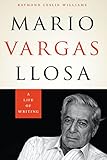Mario Vargas Llosa : a life of writing / by Raymond Leslie Williams.
Material type: TextPublication details: Austin : University of Texas Press, 2015.Description: xi, 234 p. ; 23 cmISBN:
TextPublication details: Austin : University of Texas Press, 2015.Description: xi, 234 p. ; 23 cmISBN: - 9781477309834 (pbk.)
- 863/.64
- PQ 8498.32 V297W 2015
| Item type | Current library | Home library | Collection | Shelving location | Call number | Vol info | Copy number | Status | Date due | Barcode |
|---|---|---|---|---|---|---|---|---|---|---|
 Libro
Libro
|
Biblioteca Juan Bosch | Biblioteca Juan Bosch | Humanidades | Humanidades (4to. Piso) | PQ 8498.32 V297W 2015 (Browse shelf(Opens below)) | 1 | 1 | Available | 00000112660 |
Browsing Biblioteca Juan Bosch shelves, Shelving location: Humanidades (4to. Piso), Collection: Humanidades Close shelf browser (Hides shelf browser)

|

|

|

|

|

|

|
||
| PQ 8498.32 V297v 2007 La verdad de las mentiras / | PQ 8498.32 V297v 2015 La verdad de las mentiras / | PQ 8498.32 V297w 2003 The way to paradise / | PQ 8498.32 V297W 2015 Mario Vargas Llosa : a life of writing / | PQ 8498.32 V699c 2004 El cadete Vargas Llosa : la historia oculta tras La ciudad y los perros / | PQ 8498.4 V297m 2004 La mestiza de Pizarro : una princesa entre dos mundos / | PQ 8498.432 V297e 2000 En el reino del espanto / |
Includes bibliographical references (p. 221-226) and index.
An intellectual biography -- A novelist for the twenty-first century -- Rereading Vargas Llosa -- Epilogue.
Awarded the Nobel Prize in 2010 at the age of seventy-four, Peruvian writer Mario Vargas Llosa has held pivotal roles in the evolution and revolutions of modern Latin American literature. Perhaps surprisingly, no complete history of Vargas Llosa's works, placed in biographical and historical context, has been published—until now. A masterwork from one of America's most revered scholars of Latin American fiction, Mario Vargas Llosa: A Life of Writing provides a critical overview of Vargas Llosa's numerous novels while reinvigorating debates regarding conventional interpretations of the work. Weaving analysis with discussions of the writer's political commentary, Raymond Leslie Williams traces the author's youthful identity as a leftist student of the 1960s to a repudiation of some of his earlier ideas beginning in the 1980s. Providing a unique perspective on the complexity, nuance, and scope of Vargas Llosa's lauded early novels and on his passionate support of indigenous populations in his homeland, Williams then turns his eye to the recent works, which serve as a bridge between the legacies of the Boom and the diverse array of contemporary Latin American fiction writers at work today. In addition, Williams provides a detailed description of Vargas Llosa's traumatic childhood and its impact on him—seen particularly in his lifelong disdain for authority figures—as well as of the authors who influenced his approach, from Faulkner to Flaubert. Culminating in reflections drawn from Williams's formal interviews and casual conversations with the author at key phases of both men's careers, this is a landmark publication that will spark new lines of inquiry into an intricate body of work.


There are no comments on this title.